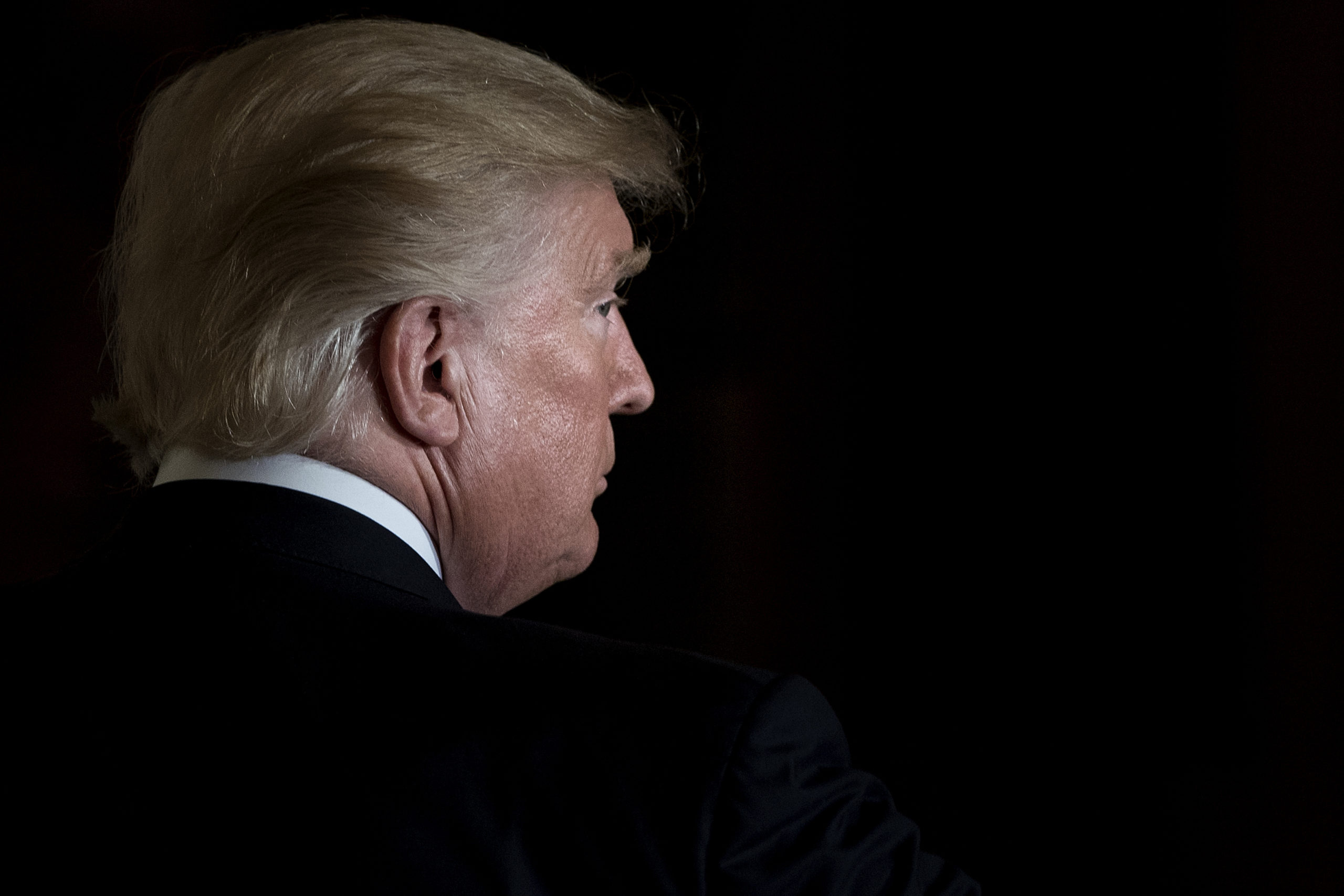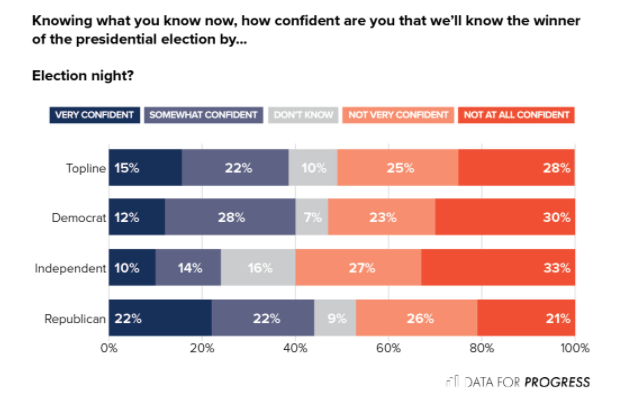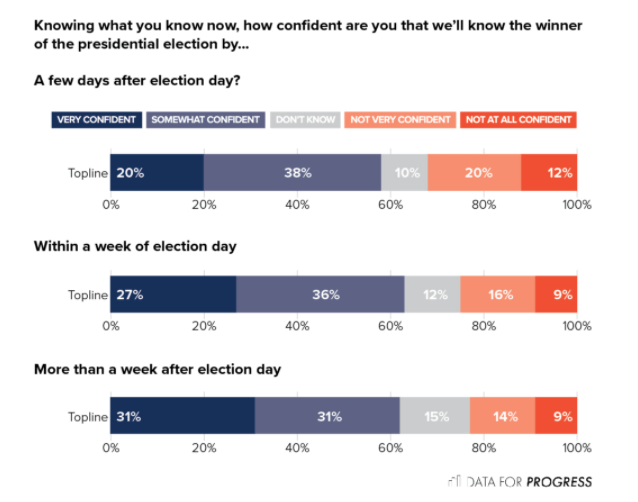Newsletter
The Count #10: How Trump Could Exploit Election Night Coverage
The Count is a daily newsletter and live show from The Appeal and NowThis, focused on what happens in the scenario that the 2020 presidential race is too close to call on election night, if President Donald Trump makes good on his promise to not accept the election results, and what we can do in the 77 days between election day and the inauguration to uphold our democracy.

Today, we’ll look at:
- New polling that shows voters still aren’t prepared to wait a long time for election results.
- How Trump could exploit voters’, and the media’s, desire for results on election night.
- The GOP push to throw out valid results by restricting mail-in ballot deadlines.
If you were forwarded this newsletter and would like to subscribe, sign up here.
THE DAILY COUNTDOWN.
- 12 days until election day.
- 47 days until the deadline for all ballots to be counted.
- 53 days until electoral college slates send their votes to Congress.
- 76 days until Congress counts electoral college votes.
- 90 days until inauguration day.
NEW POLL: VOTERS STILL NOT PREPARED FOR “ELECTION SEASON”
During this year’s primaries, it took nearly a week to count the votes in three key battleground states—Arizona, Pennsylvania, and Wisconsin. In Pennsylvania, election officials had 1.5 million mail-in ballots to count. In the general election, Pennsylvanians have requested nearly twice that many. It will likely take longer than a week, perhaps much longer, for the Pennsylvania election officials to process and count all these mail-in ballots.
New polling from Data for Progress and The Justice Collaborative Institute shows that —while fewer voters expect results on election night—they’re still not prepared for how long the vote counting process could take.
After being given information about mail-in voting, the poll found:
- 53% of voters, including 47% of Republicans, are not confident an election winner will be announced on Nov. 3.

- 58% of voters are confident the winner will be known a few days after Nov. 3, and 63% are we’ll know within a week.

- KEY TAKEAWAY — Voters have a more realistic understanding that election results are unlikely to point to a winner on election night, but they still struggle to understand how long the timeline could be. A majority of voters are confident results will arrive within a week. This is a reminder of the importance of educating voters about how long it takes to count mail-in ballots.
HOW TRUMP COULD EXPLOIT ELECTION NIGHT COVERAGE
Big chyrons. Big interactive screens. Big red, white, and blue “battle for the White House” animations. Election night has long been the political media’s Super Bowl. In a country without a national election commission, the media is the official kingmaker. But history has shown how this system can go horribly awry.
In 2018, a CNN commentator announced, “It’s not a blue wave,” before the House of Representatives flipped to Democrats. Earlier this year, anchors were all speechless when they had nothing to announce from the Iowa caucuses.
In 2000, TV networks first announced Al Gore would win Florida, but a few hours later projected George W. Bush to take both Florida and the White House. Gore called Bush to concede, but as numbers kept coming, the TV networks withdrew their projections, and Gore retracted his concession just an hour later.
In the aftermath of 2000, Jeff Zucker, a producer of NBC’s coverage, who is now the president of CNN, admitted, “We made mistakes based on bad information. If you make a mistake and own up to it, that’s fine.”
Actually, it wasn’t fine. The media’s brief victory call for Bush had a lasting effect on public opinion:
“It really takes hold in your mind, and for a lot of Americans that was hard to shake … A Bush victory felt like affirming what they saw on TV and a Gore victory felt like overturning it.”– The Count guest Jay Willis
Willis, a senior contributor at The Appeal, recently wrote about the 2000 election in “Election night coverage is broken. In 2020, it could be dangerous” about how covering the election should be less football final, more “first day of the Tour de France.”
If the media doesn’t adequately prepare their audiences for the dynamics of counting results amid a surge of in mail-in ballots, or prematurely calls the election for Trump, it will provide a potent clip or headline that will further allow Trump to declare himself the winner.
This could set off the same wave of events that happened in 2000, with public support for Joe Biden dipping just as lawsuits ramp up, actually stacking opinion in favor of Trump stealing the election and against a legitimate count.
The good news is that TV networks are saying they are prepared for more of an “‘election week’ rather than election day.” Network executives have even said announcing a winner with confidence will be “a longer process” and that election night “is not going to be about storylines or narratives or projections or predictions.”
But TV hosts can’t even predict their own shows, let alone an election.
“Let’s get one thing straight right from the get-go: We would rather be last in reporting returns than be wrong,” Dan Rather said on CBS at the beginning of election night 2000. “If we say somebody’s carried the state, you can take that to the bank.”
Hours later he called the election for Bush.
ANOTHER GOP PUSH TO THROW OUT VALID VOTES
With mail-in ballots playing a pivotal role this year, and open questions around the U.S. Postal Service’s ability to promptly deliver these ballots, many states have tried to extend, or blocked extending, the deadline for mail-in ballots to be received if they are postmarked by the state deadline. Republicans’ are lining up against extending deadlines, in yet another attempt to further restrict whose votes will be counted.
Here’s a sampling of their efforts:
- GEORGIA — The New Georgia Project, founded by Stacey Abrams, sued the Republican secretary of state and won a three-day extension. The state appealed, and the court reverted the deadline back to election day.
- MICHIGAN — The Republican-controlled legislature appealed a September ruling that granted a 14 day deadline extension. An appeals court instead ruled that ballots must be received by 8 p.m. on election day.
- NORTH CAROLINA — Republican lawmakers sued over plans to extend the ballot deadline. After their case was rejected, the Trump campaign and state Republican party, appealed and lost. Mail-in ballots can be accepted until Nov. 12.
- PENNSYLVANIA — The state Republican party sued the Democratic secretary of state to block a ballot extension. The U.S. Supreme Court deadlocked, allowing the state’s Supreme Court ruling, to accept ballots 3 days after election day, to stand.
- WISCONSIN — The Democratic Party sued the Republican-appointed secretary of the Wisconsin Elections Commission, which led to a judge ruling that ballots could be accepted until Nov. 9. This was blocked by an appeals court and Democrats have taken the case to the U.S. Supreme Court.
WHAT WE ARE TRACKING
- The FBI is investigating election interference by Russia and Iran. Both countries, according to the director of national intelligence, gained access to voter information and “have taken specific action to influence public opinion.” Iran was behind “spoofed” emails sent to voters in as many as four states, including Florida, threatening them to vote for Trump. Crucial advice from the DNI: “If you receive an intimidating or manipulative email in your inbox, do not be alarmed and do not spread it.”
- Senior government officials are pushing back on Trump’s urging to have election results finalized on election night. “There’s a very good chance that we will not know the winner of the presidential election, for instance, on election night itself. And that’s not because something isn’t working,” a Trump appointee at DHS said.
- The U.S. Supreme Court blocked a lower court ruling that allowed curbside voting in Alabama. The vote was 5-3 along party lines.
- USPS is pulling its uniformed officers off the streets just weeks ahead of the election. The officers’ patrols were meant to prevent robberies of mail boxes.
- “Witchcraft” is how one expert described signature matching, the process that states rely on to verify–and reject–mail-in ballots.
- Misinformation is popping up on Spanish-language media and trying to create tension between Latinx and Black voters.
- Mississippi voters will now be notified by election officials if there are problems with their ballots and have 10 days to fix them.
